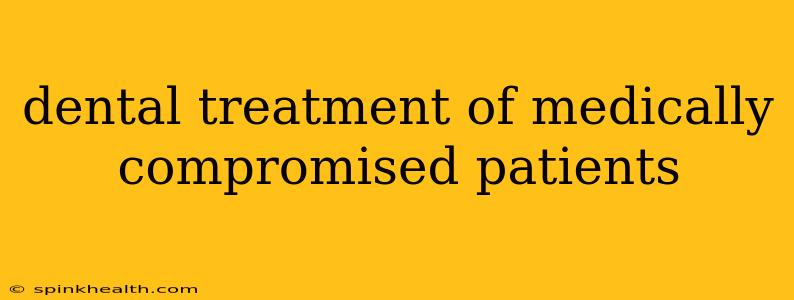The gentle hum of the dental drill, usually a symbol of routine care, can feel like a looming threat for medically compromised patients. Their unique health conditions introduce complexities that demand a nuanced and careful approach from dental professionals. This isn't just about filling a cavity; it's about managing potential risks and ensuring a safe and successful dental experience. Let's delve into the world of dental treatment for these individuals, exploring the challenges, considerations, and collaborative strategies that ensure optimal oral health.
What are Medically Compromised Patients?
Medically compromised patients encompass a broad spectrum of individuals with underlying health conditions that can impact their dental treatment. This isn't limited to severe illnesses; it includes anyone whose medical history might influence their response to dental procedures or anesthesia. Think diabetes, heart conditions, autoimmune disorders, kidney disease, respiratory problems, or those undergoing cancer treatment – the list is extensive. Even seemingly minor conditions, when combined, can create a complex medical picture. The key is recognizing that their overall health significantly influences their dental care.
What Special Considerations are There for Treating Medically Compromised Patients?
Treating medically compromised patients requires a multi-faceted approach. It's not simply about modifying the treatment plan, but also about understanding the patient's overall health and potential complications. This holistic perspective is paramount.
H2: How is Medical History Relevant to Dental Treatment?
A patient's medical history forms the bedrock of their dental treatment plan. Understanding their medications, current health status, and past medical events is crucial. For instance, a patient on blood thinners requires careful consideration to minimize bleeding risks during procedures. Similarly, a patient with a heart condition might need pre-medication to prevent complications during dental work. This comprehensive understanding isn't just a formality; it's a life-saving measure.
H2: What are the Risks Involved in Dental Treatment for Medically Compromised Patients?
The risks associated with dental treatment for medically compromised patients are multifaceted and depend on the specific condition. These can include:
- Increased risk of infection: Patients with weakened immune systems are more susceptible to infections, making meticulous infection control protocols essential.
- Adverse reactions to medication: Interactions between dental medications and existing medications can occur, necessitating careful medication review and potential adjustments.
- Cardiovascular complications: Stress associated with dental procedures can impact patients with heart conditions; pre-medication and careful monitoring are crucial.
- Respiratory complications: Patients with respiratory problems might require modifications in treatment techniques and settings to avoid respiratory distress.
- Bleeding complications: Patients on anticoagulants require careful management to control bleeding during and after procedures.
H2: What is the Role of Collaboration Between Dentists and Physicians?
The most effective approach involves seamless collaboration between dentists and physicians. Regular communication ensures that the dental treatment plan aligns perfectly with the patient's overall health management. This might involve consultations, shared medical records, and joint decision-making to minimize risks and maximize the success of both medical and dental interventions. It's a partnership that ensures the patient’s well-being above all else.
H2: What Types of Dental Procedures are Suitable for Medically Compromised Patients?
The suitability of various dental procedures depends entirely on the patient's condition. While some patients can undergo routine procedures with minor modifications, others might require a more conservative or phased approach. The dentist carefully considers the individual's health profile to determine the safest and most effective treatment plan.
H2: How Can I Find a Dentist Experienced in Treating Medically Compromised Patients?
Finding a dentist experienced in treating medically compromised patients is a crucial step. Look for dentists who explicitly mention this expertise in their practice descriptions. Professional organizations and medical centers often provide referral services for specialists experienced in this area. Your physician can also be a valuable resource in recommending a suitable dental professional.
Treating medically compromised patients is not just a matter of technical skill; it’s a testament to compassionate and holistic care. It's a journey requiring thorough preparation, meticulous execution, and unwavering collaboration—all driven by a commitment to providing the best possible oral health care within the patient's individual circumstances. This ensures that the experience remains as positive and safe as possible.

